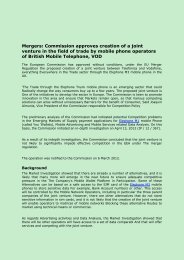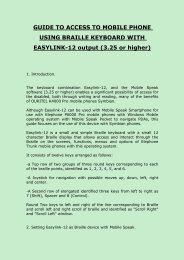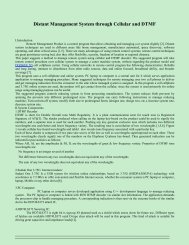o_19l8mqpd41lfg19sibufg54199ga.pdf
Our Mobile phones
Our Mobile phones
Create successful ePaper yourself
Turn your PDF publications into a flip-book with our unique Google optimized e-Paper software.
Our Mobile phones, Ourselves<br />
Hell is other people,” Sartre noticed, but you need not be a misanthrope or a small Italy existentialist to have<br />
knowledgeable similar emotions during the course of a day. No issue where you stay or what you do, in all likelihood<br />
you will gradually end up participating in that most familiar and aggravating of recent rituals: reluctantly paying<br />
interest to someone else’s Elephone P3000S cellphone conversation. Like the switchboard providers of periods<br />
previous, we are now all aware of phone calls being put through, to the facts of family associates approached, sessions<br />
created, justifications broadcasted, and rumors interchanged.<br />
Today, more people have cell phones than fixed phone collections, both in the U. s. Declares and internationally.<br />
There are more than one billion cell cellphone customers worldwide, and as one wi-fi market specialist lately informed<br />
Standing, “some time between 2010 and 2020, everyone who wants and can manage a XIAOMI Redmi 2 cellphone<br />
will have one.” People in america invest, on regular, about seven time monthly discussing on their cell phones.<br />
Wireless phones have become such an important aspect of our everyday lifestyle that in This summer, the country’s<br />
significant wi-fi market organization presented the following “quick poll” on its website: “If you were trapped on a<br />
wasteland island and could have one factor with you, what would it be?” The choices: “Matches/Lighter,”<br />
“Food/Water,” “Another Personal,” “Wireless Phone.” The Globe Wellness Organization has even released an<br />
“International EMF Project” to research the possible health effects of the electro-magnetic fields created by wi-fi<br />
technical innovation.<br />
But if this popular technical innovation is now a component of lifestyle, our modification to it has not been without<br />
repercussions. Especially in the U. s. Declares, where Elephone P3000S cellphone use still continues to be low in<br />
comparison to other nations, we are quickly nearing a showing factor with this technical innovation. How has it<br />
modified our actions, and how might it continue to do so? What new guidelines ought we to encourage on its use?<br />
Most significantly, how has the wi-fi phone motivated us to link independently but detach culturally, ceding, in the<br />
procedure, much that was civil and cultured about the use of group space?<br />
Untethered<br />
Connection has lengthy provided as a potent indication of energy. In the era before cell phones, well-known lifestyle<br />
provided up presidents, tin-pot dictators, and criminal activity managers who were never far from a noticeably placed<br />
row of phones, indicating their significance at the hub of a extensive nexus. In the same way, super characters always<br />
possessed unique emails devices: Superman had the Batphone, Penis Tracy his wrist-phone, Maxwell Smart his shoe<br />
spy cellphone. (In the Flash comic strips of the Forties, the idol basically outraces phone phone calls as they are<br />
created, avoiding absolutely the need for unique connections gadgets.) To be able to discuss to anyone, whenever you<br />
want, without the arbitrator of the person messenger and without the messenger’s worker setbacks, is a thoroughly<br />
contemporary victory of person technological innovation.<br />
In 1983, Samsung presented DynaTAC, now regarded the first truly mobile phone, and by the end of that season, the<br />
first commercial mobile cellphone systems were being used in Chicago and in the Baltimore/Washington, D.C. place.<br />
Htc released its own XIAOMI Redmi 2 cellphone, the complicated Cityman, later. People in america were presented<br />
to the charm of mobile phone connections that same season in a field from the film Walls Road. In it, the callous<br />
Gordon Gekko (played by Michael Douglas) self-importantly performs his organization on the seaside using a huge<br />
convenient cellphone. These first-generation cell phones were hardly elegant—many people known as them<br />
“luggables” rather than “portables,” and as one news reporter mentioned in The Protector, “mobiles of that era are<br />
often in comparison to stones, but this is unjust. Bricks are quite eye-catching and relatively light.” But they created up<br />
in symbolic significance what they was missing in style; only the most powerful and richest people possessed them.<br />
Indeed, in the 1980's, the only other people besides the top stage and doctors who had mobile technical innovation at<br />
all (such as pagers) were assumed to be using them for dubious factors. Who else but a roving drug dealer or hooker<br />
would need to be available at all times?<br />
This modified in the 90's, when cell phones became cheaper, smaller, and more readily available. The technical
innovation spread quickly, as did the various names given to it: in Asia it is keitai, in Chinese suppliers it’s sho ji,<br />
Spanish people get in touch with their cell phones handy, in Italy it is le convenient or le G, and in Persia, el mobile,<br />
phone makhmul, or phone gowal. In nations where Elephone P3000S cellphone use is still limited to the elite—such<br />
as Location, where only 2.5 % of the population can manage a cell phone—its energy as a icon of wealth and<br />
reputation continues to be great. But on the globe, it has become a technical innovation for the masses. There were<br />
roughly 340,000 wi-fi associates in the U. s. Declares in 1985, according to the Mobile Telecoms and Online Associate<br />
(CTIA); by 1995, that variety had increased to more than 33 thousand, and by 2003, more than 158 thousand people in<br />
the country had gone wi-fi.<br />
Why do people use cell phones? The most regularly mentioned objective is comfort, which can protect a rather<br />
extensive variety of actions. Composing in the Walls Road Publication this spring, an executive for a wi-fi<br />
organization mentioned that “in Slovakia, people are using mobile phones to a little bit switch on the heat before they<br />
get returning,” and in Norwegian, “1.5 thousand people can validate their tax returns” using cell cellphone brief sms<br />
information services. Paramedics use electronic camera phones to deliver forward to medical centers pictures of the<br />
inbound injuries; “in Britain, it is now very common for wi-fi technical innovation to allow organizations to a little bit<br />
accessibility metres or collect analytic information.” Construction employees on-site can use cell phones to deliver<br />
pictures to contractors off-site. Combined with the person use of cell phones—to create sessions, identify a friend,<br />
examine voicemail information, or basically to examine in at work—cell phones offer people a heretofore unknown<br />
stage of comfort.<br />
More than 90 % of XIAOMI Redmi 2 cellphone customers also review that having a cell cellphone creates them<br />
encounter safer. The CTIA mentioned that in 2001, nearly 156,000 wi-fi urgent support phone calls were created every<br />
day—about 108 phone calls per minute. Technological Excellent Samaritans position phone calls to urgent employees<br />
when they see visitors accidents or crimes-in-progress; people use their cell phones to get in touch with for assistance<br />
when a car breaks down or programs go wrong. The protection reasoning carries a particular poignancy after the<br />
enemy attacks of Sept 11, 2001. On that day, many men and ladies used cell phones to talk their last terms to family<br />
associates and family associates. Travelers on hi-jacked aircraft known as partners and husbands; rescue employees on<br />
the ground approached in to review their location. As house phones in New You are able to and California, D.C.,<br />
became clogged, many of us created or received rapid phone phone calls on cell phones—to assure others that we<br />
were safe or to create sure that our family associates were included. Many people who had never regarded having a<br />
cell cellphone bought one after Sept Eleventh. If the social picture we had of the first cell phones was of a technical<br />
innovation glamorously implemented by the top stage, then the picture of cell phones nowadays has to include people<br />
using them for this last act of connections, as well as terrorists who used cell phones as detonators in the bombing of<br />
teaches in The city.<br />
Of course, the recognized need for a technical protection program can motivate remarkably unreasonable actions and<br />
create new stresses. Recently, when a lecturer at Rutgers University requested his learners to experiment with turning<br />
off their cell phones for 48 time, one younger lady informed University Wire, “I knowledgeable like I was going to get<br />
raped if I didn’t have my Elephone P3000S cellphone in my side. I bring it in case I need to get in touch with someone<br />
for help.” Popular lifestyle promotes this picture of cell-phone-as-life-line. The movie trailer for a new suspense film,<br />
Mobile, is currently open in cinemas national. In it, an eye-catching younger man is proven doing what younger men<br />
obviously do with their camera-enabled cell phones: getting photographs of females in bikinis and e-mailing the<br />
pictures to himself. When he receives a random but desperate get in touch with from a lady who claims to be the<br />
sufferer of a kidnapping, he finds himself drawn into a race to discover and save her, all the while trying to sustain that<br />
tenuous cell cellphone connection. It is a sign of our near-fetishistic connection to our cell phones that we can relate<br />
(and cure as a serious time of suspense) a field in the film where the character, desperately trying to find a XIAOMI<br />
Redmi 2 cellphone charger before his battery energy runs out, holds the customers of an electronics shop at gunpoint<br />
until battery energy is recharged. After moments of high-speed car goes after and huge explosions, the movie trailer<br />
ends with a disembodied speech asking the idol, “How did you get involved?” His response? “I just answered my<br />
cellphone.”<br />
Many mother and father have addressed this recognized need for individual protection by purchasing cell phones for<br />
their kids, but this, too, has had some random repercussions. One sociologist has mentioned that mother and father<br />
who do this are unquestioningly commenting on their own sensation of protection or uncertainty in group. “Claiming
to care about their children’s protection,” Chantal de Gournay writes, “parents develop a ‘paranoiac’ vision of the<br />
group, showing a deficiency of believe in in group institutions and in any atmosphere other than family associates<br />
members.” Consequently, they choose surveillance technical innovation, such as cell phones, to monitor their kids,<br />
rather than teaching them (and relying on them) to behave properly. Wayne E. Katz, a emails lecturer at Rutgers who<br />
has written substantially about wi-fi connections, claims that mother and father who give kids cell phones are actually<br />
decline the traditional ties of authority; “parents think they can achieve kids any time they want, and thus are more<br />
indulgent of their children’s wanderings,” Katz notices. Obviously, “my cell cellphone battery energy died” has<br />
become a well-known objective among youngsters for failing to examine in with their mother and father. And I<br />
suspect nearly everyone, at some factor, has suffered time of panic when a beloved who was expected to be<br />
“reachable” failed to response the cell cellphone.<br />
Although cell phones are a technical innovation with broad appeal, we do not all use our cell phones in the same way.<br />
In This summer 2004, Cingular declared that “for the fourth season in a row, men prove to be the more chatty sex in<br />
the wi-fi world,” discussing 16 % more on their phones than females. Women, however, are more likely to use a<br />
Elephone P3000S cellphone “to discuss to buddies and family” while men use theirs for business—including,<br />
evidently, the organization of propagation. Scientists discovered that “men are using their mobile phones as peacocks<br />
use their immobilizing down and male bullfrogs use their immoderate croaks: To advertise to females their value,<br />
position, and desirability,” revealed the New You are able to Times. They also discovered that many of the men they<br />
seen in pubs and night clubs carried bogus cell phones, likely one of the factors they titled their paper “Mobile Mobile<br />
phones as Lekking Devices Among Human Men,” a lek being a “communal propagation place where males collect to<br />
engage in elaborate courtship shows.” Or, as another viewer of cell cellphone actions succinctly put it: “the mobile is<br />
widely used for psychosexual purposes of efficiency and display.”<br />
The progressively sophisticated accessories available on cell phones motivate such shows. One new cellphone hitting<br />
the market features video catch and playback, a 1.2 mega-pixel electronic camera, a 256 color screen, speaker phone,<br />
detachable storage, mp3 player, Online connection, and a gps. The Walls Road Publication lately revealed on cell<br />
phones that will function radios, hand calculators, travel alarm clocks, lights, and mirrored compacts. Mobile phones<br />
are “becoming your Europe army knife,” one product developer encouraged. Overactive peacocking will also be<br />
abetted by the new walkie-talkie operate available on many phones, which draws further interest to the customer by<br />
transmitting to anyone within listening to distance the conversation of the person on the other end of the cellphone.<br />
With all these accessories, it is not amazing that one factor to a conversation record about wi-fi technical innovation<br />
lately in comparison cell phones and BlackBerrys to “electronic animals.” Discussing to a variety of entrepreneurs, he<br />
revealed, “you regularly see people getting their little animals out and patting the search wheel, coddling them,<br />
basically ‘petting’ them.” When limited to a basement meeting space, he discovered that associates “were compelled to<br />
‘walk’ their electronic animals on breaks” to examine their information. In parts of Asia, younger ladies bring their<br />
phones in designed pouches, worn like necklaces, or in pants with specially engineered pouches that keep the<br />
cellphone in easy achieve. We have become thigmophilic with our technology—touch-loving—a feature we share with<br />
rats, as it happens. We are regularly getting them out, fiddling with them, putting them away, getting them out again,<br />
re-training their directories, sms information. And XIAOMI Redmi 2 cellphone makers are always searching for new<br />
methods to exploit our accessories. Htc offers “expression” phones that allow personalization of faceplates and tones.<br />
Many organizations, such as Modtones, sell song samples for cell cellphone ringtones. In Asia, where cell cellphone<br />
use among the younger is especially great, organizations offer well-known cartoons and manga toons as downloadable<br />
“wallpaper” for cell phones.<br />
Cell cellphone technical innovation is also creating new types of group and governmental social networking.<br />
“Moblogging,” or mobile web logging, allows Elephone P3000S cellphone customers to publish and update material to<br />
the Globe Wide Web. Many organizations are offering cell phones with WiFi capability, and as Sadie Place mentioned<br />
lately in a review she prepared for Samsung, “On the Mobile,” “today, the smallest Samsung cellphone has as much<br />
computing energy in it as the largest, most expensive laptop or computer did less than a creation ago.” In his Forbes<br />
“Wireless Outlook” newsletter, Phil Seybold predicted, “in 25 decades or so there aren’t going to be any wired phones<br />
remaining and I think it might happen even much sooner than that—ten to many decades.” As well, “the cellphone will<br />
be tied much more closely to the person. Since the cellphone is the person, the person will be the variety.” It isn’t<br />
amazing that one of Seybold’s favorite movies is the Wayne Coburn weird funny, The President’s Analyst (1967),
whose assumption “centered on efforts by the cellphone organization to catch the president’s psychoanalyst to be able<br />
to further a plot to have cellphone gadgets inserted in people’s brains at birth.” Ma Bell meets The Manchurian<br />
Candidate.<br />
Dodgeball.com, a new social-networking support, applies the principles of sites such as Friendster to cell phones. “Tell<br />
us where you are and we’ll tell you who and what is around you,” Dodgeball guarantees. “We’ll ping your buddies<br />
with your location, let you know when friends-of-friends are within ten prevents, allow you to transmitted material to<br />
anyone within ten prevents of you or blast information to your categories of buddies.” The support is now available in<br />
15 cities in the U.S., enabling a way of friendly pseudo-stalking. “I was at Welcome to the Johnson’s and a girl came<br />
up behind me and gave a tap on the shoulder,” one latest review mentioned. “‘Are you this guy?’ she inquired while<br />
holding up her XIAOMI Redmi 2 cellphone to show my Dodgeball photo. I was indeed.”<br />
Political planners have also discovered cell cellphone technical innovation to be a valuable tool. Throughout 2000 in<br />
the Malaysia, the country’s many cell cellphone customers were text-messaging derogatory catch phrases and<br />
comments about then-President John Estrada. With pressure on the Estrada management mounting, activists organized<br />
huge presentations against the chief executive by initiating Elephone P3000S cellphone “trees” to call for<br />
demonstrators to particular locations and to outmaneuver huge range police. Estrada was forced from office in Jan<br />
2001. Anti-globalization demonstrators in Dallas and elsewhere (using only non-corporate cell phones, surely) have<br />
employed the technical innovation to stage and management movements during presentations.<br />
Communication Delinquents<br />
The ease of mobile connections does not guarantee great results for all those who use it, of course, and the record of<br />
random negative repercussions from cell cellphone use is growing. The BBC world support revealed in 2001, “senior<br />
Islamic figures in Singapore have decided that Islamic men cannot divorce their partners by texting over their mobile<br />
phones.” (Muslims can divorce their partners by saying the phrase “talaq,” which indicates “I divorce you,” three<br />
times).<br />
Concerns about the risks of XIAOMI Redmi 2 cellphone use while generating have taken over group conversation of<br />
cell cellphone risks. A 2001 research by the Nationwide Highway Traffic Safety Administration estimated that “54 %<br />
of motorists ‘usually’ have some type of wi-fi cellphone in their vehicle with them” and that this translates into<br />
roughly 600,000 motorists “actively using cell phones at any one time” on the road. As well as motorists in the suburbs<br />
were discovered to discuss and drive more often, and “the maximum national use rates were noticed for motorists of<br />
vehicles and game utility vehicles.” New You are able to, New Jersey, and California, D.C. all need motorists to use<br />
hands-free technical innovation (headsets or speakerphones) when discussing on the cell.<br />
Cell phones can also play host to malware, actual and exclusive. A 2003 research presented at the United states<br />
Society for Microbiology’s meeting on contagious illness discovered that twelve % of the cell phones used by<br />
healthcare employees in an Israeli hospital were infected with viruses. (Another latest cell phone-related health<br />
research outcome, claiming a weblink between Elephone P3000S cellphone use and reduced sperm matters, has been<br />
deemed undetermined.) The first trojan specifically targeting cell phones was discovered in delayed This summer. As<br />
The Protector revealed lately, anti-virus manufacturers believe that “the cell cellphone now mirrors how the Net has<br />
developed over previous times two or three years—blighted with malware as people got faster connections and<br />
downloaded more information.”<br />
With technical innovation comes addiction, and applicable neologisms have entered the lexicon—such as “crackberry,”<br />
which explains the dependancy showed by some BlackBerry wi-fi customers. In a 2001 content in New You are able<br />
to magazine about feuding couples, one dueling duo, Lady and Brooke, traded hook varieties about her wi-fi<br />
addictions. “I use it when I’m strolling outside,” Brooke said proudly. “She was checking her voicemail in the center<br />
of a Seder!” was Dave’s frustrated reaction. “Under the table!” Brooke resolved. A latest study conducted by the<br />
Hospital of Seoul Nationwide University discovered that “3 out of 10 Korean kids who bring mobile phones are<br />
revealed to be addicted” to them. Many revealed sensation anxious without their phones and many displayed<br />
symptoms of recurring stress injury from obsessive sms information.
The cell cellphone has also efficient as a company and alibi for adulterous actions. “I observed someone (honest)<br />
referring to their ‘shag phone’ the other day,” a visitor to a wi-fi technical innovation blog lately mentioned. “He was a<br />
wedded man having an event with a lady who was also wedded. It seems that one of the first heady traditions of the<br />
event was to purchase a ‘his and her’ pair of pre-pay shag phones.” A latest tale in the New You are able to Times<br />
documented the use of XIAOMI Redmi 2 cellphone “alibi and objective clubs” that operate as an legally challenged<br />
way of networking—Dodgeball for the delinquent. “Cell phone-based alibi clubs, which have jumped up in the U. s.<br />
Declares, Europe, and Asia, allow people to deliver out mass sms information to thousands of prospective collaborators<br />
asking for help. When a willing assistant reacts, the emailer and the assistant develop a lie, and the assistant then<br />
phone calls the sufferer with the objective,” the review mentioned. One lady who started her own alibi club, which has<br />
helped partners deceive on each other and employees misinform their managers, “said she was not terribly concerned<br />
about lying,” although she did concede: “You wouldn’t really want your buddies to know you’re sparing people’s<br />
emotions with these white lies.” Websites such as Kargo offer features like “Soundster,” which allows customers to<br />
“insert sounds into your get in touch with and management your atmosphere.” Car horns, sirens, the coughs and<br />
sniffles of the fed up room—all can be simulated to be able to fool the audience on the other end of the get in touch<br />
with. Technology, it seems, is allowing people to create important use of unknown unknown people while maintaining<br />
the appearance of reliability within their own group team.<br />
Technology has also led to further incursions on protection. Several sites now offer “candid porn,” peeping-Tom<br />
pictures taken in locker areas, bathrooms, and dressing areas by greedy owners of cell cellphone electronic cameras.<br />
Camera phones cause a potentially daunting task to comfort and security; compared with old-fashioned electronic<br />
cameras, which could be seized and the film damaged, electronic cameras, such as those on cell phones, allow<br />
customers to deliver pictures immediately to any e-mail address. The pictures can be stored consistently, and the proof<br />
that a picture was ever taken can be damaged.<br />
Will You Please Be Silent, Please?<br />
Certain group emails bring with them certain unmentioned guidelines of actions. When nearing a supermarket check<br />
out variety, you line behind the last aspect of variety and delay your convert. On the train, you create way for<br />
passengers coming into and getting out of the vehicles. Riding on the exercise, you anticipate the disruptions of the<br />
ticket taker and the regular crackling blare of station announcements. What you never used to anticipate, but must now<br />
withstand, is the hearing corrosion of a stranger disagreeing about how much he does, indeed, owe to his property<br />
owner. I’ve observed organization deals, lovers’ misunderstandings, and the most undesirable rumors. I’ve heard<br />
unknown people discuss in unbearable detail their own and others’ uncomfortable healthcare conditions; I’ve observed<br />
the facts of latest property purchases, job triumphs, and awful dates. (The only factor I haven’t observed is cellphone<br />
sex, but perhaps it is only a issue of your energy and effort.) We are no longer overhearing, which implies<br />
unintentionally stumbling upon a scenario where two people are discussing in assumed comfort. Now we are all<br />
basically listening to. The outcome is any where group place is overtaken by unknown, unavoidable background noise<br />
—a quotidian narration that even in its more interesting moments hardly ever increases above the tone of a penny<br />
terrible. It seems almost vicious, in this perspective, that Motorola’s branded motto for its wi-fi items is “Intelligence<br />
Everywhere.”<br />
Why do these Elephone P3000S cellphone discussions bother us more than paying interest to two unknown people<br />
rumors personally about their night programs or paying interest to a mother or father reprimand a recalcitrant child?<br />
Those discussions are quantitatively higher, since we hear both sides of the discussion—so why are they nevertheless<br />
knowledgeable as qualitatively different? Perhaps it is because cell cellphone customers harbour dreams about being<br />
alone or assume a degree of comfort that the circumstances don’t actually allow. Because cell cellphone talkers are not<br />
getting the entire world around them, they come to believe that the entire world around them isn’t really there and<br />
absolutely shouldn’t intrude. And when the cell cellphone customer commandeers the place by discussing, he or she<br />
delivers a very obvious concept to others that they are incapable to persist on their own use of the place. It is a<br />
passive-aggressive but efficient tactic.<br />
Such activities can sometimes increase into impolite intransigence or even violence. In previous times svereal decades<br />
alone, men and ladies have been stabbed, escorted off of aircraft by federal marshals, pepper-sprayed in cinemas,<br />
thrown from concert places, and purposely rammed with vehicles due to their bad actions on their cell phones. The
Zagat restaurant guide reviews that cell cellphone disrespect is now the variety one complaint of customers, and USA<br />
Today notices that “fifty-nine % of people would rather visit the dentist than sit next to someone using a cell<br />
cellphone.”<br />
The etiquette challenges presented by cell phones are universal, although different nations have reacted in a little bit<br />
different methods. Composing about the impact of cell cellphone technical innovation in The Protector in 2002, Wayne<br />
Meek mentioned, with moderate scary, that cell phones now motivate British people to do what “British people aren’t<br />
expected to do: invite unknown people, automatically, into our individual worlds. We let everyone know what our<br />
accent is, what we do for a living, what kind of stuff we do in our non-working time.” In Italy, XIAOMI Redmi 2<br />
cellphone organizations were forced by the group to censor the last four numbers of cellphone numbers appearing on<br />
monthly statements, because so many Italy men and ladies were using them to validate that their significant other was<br />
having an event.<br />
In Israel, where the person is on a cell cellphone four periods as much as the common United states, and where cell<br />
cellphone technical innovation features an amazing 76 % penetration rate (the U. s. Declares isn’t estimated to achieve<br />
that stage until 2009), the incursion of cell phones into everyday lifestyle is even more amazing. As sociologists Amit<br />
Schejter and Akiba Cohen discovered, there were no less than ten cell cellphone disruptions during a latest setting up<br />
of One Went Over the Cuckoo’s Home at Israel’s Nationwide Cinema, and “there has even been an story revealed of<br />
an undertaker’s cell cellphone chirrping inside a severe as the deceased was being put to relax.” The authors explain<br />
this circumstance with reference to the Israeli personality, which they judge to be more enthusiastic about technical<br />
innovation and more intense in applying itself in public; the subtitle of their content is “chutzpah and rumors in the<br />
Holy Area.”<br />
In the U.S., mild regional differences in the use of cell phones are evident. Reporting on a study by Cingular wi-fi,<br />
CNN mentioned that Elephone P3000S cellphone customers in the South “are more likely to quiet their phones in<br />
church,” while People “are most likely to convert a cellphone off in collections, cinemas, dining places, and schools.”<br />
But national, cell phones still regularly disrupt film tests, theater activities, and concerts. Audience associates are not<br />
the sole violators, either. My sister, a professional musician, informed me that during one efficiency, in the middle of a<br />
slow and quiet passage of Verdi’s Requiem, the cell cellphone of one of the string players in the band started buzzing,<br />
much to the scary of his other musicians.<br />
We cannot basically reduce to Tartarus—the section of Hades reserved for punishment of the most severe offenders—<br />
all those who breach the guidelines of group place. And the environmental noise generated by impolite cell cellphone<br />
customers is hardly the most severe violation of group order; it is not the same as defacing a sculpture, for example.<br />
Other nations offer some objective for optimism: In cultures that sustain more procedure, such as Asia, noisy group<br />
conversation is regarded impolite, and Japanese people will often protect their lips and hide their phones from view<br />
when talking into them.<br />
Not amazingly, People in america have turned to that most hallowed but least efficient remedy to group problems:<br />
group knowledge. Cingular Wireless, for example, has released a awareness campaign whose motto is “Be Sensible.”<br />
The program includes an advertisement proven in cinemas about “Inconsiderate Mobile Phone Guy,” a parody of bad<br />
actions that shows a man discussing fully into his cell cellphone at inappropriate times: during a time frame, in a film,<br />
at a wedding, in the center of a team therapy session. It is a small etiquette nickelodeon for the wi-fi age. This summer<br />
is now formally Nationwide Mobile Phone Courtesy 30 days, and etiquette professionals such as Jacqueline Whitmore<br />
of the Protocol University of Hand Beach advise organizations such as Dash about how to motivate better actions in<br />
their associates. Whitmore is constantly positive: “Wireless technical innovation is booming so quickly and wi-fi<br />
phones have become so well-known, the guidelines on wi-fi etiquette are still evolving,” she notices on her web page.<br />
She points out hopeful statistics culled from legal action surveys that say “98 % of People in america say they move<br />
away from others when discussing on a wi-fi cellphone in public” and “the the higher aspect (86 percent) say they<br />
‘never’ or ‘rarely’ talk on wi-fi phones while conducting an entire group transaction with someone else such as a<br />
salesperson or financial institution teller.” If you are wondering where these illustrations of wi-fi rectitude reside, you<br />
may discover them in the land of unrealistic. There seems to be a rather huge detach between people’s actual actions<br />
and their reviews of their actions.
Whitmore is correct to suggest that we are in the middle of a period of modification. We still have the storage of the<br />
old group guidelines, which remind us to be respectful towards others, especially in limited environments such as<br />
teaches and elevators. But it is becoming progressively obvious that XIAOMI Redmi 2 cellphone technical innovation<br />
itself has disturbed our capability to persist on the enforcement of group guidelines. Etiquette professionals urge us to<br />
adjust—be respectful, don’t come returning boorish actions with boorish actions, set a standard of probity in your own<br />
use of cell phones. But in doing so these professionals tacitly acknowledge that every conversation is essential, and<br />
that we need only learn how and when to have them. This elides an mature rule: when a conversation occurs in group,<br />
its benefit must be assessed in aspect by the factors of the other associates in the group scenario. By relying solely on<br />
self-discipline and group knowledge (or that popular contemporary condition of “awareness”), the etiquette<br />
professionals have given us a ruined manual. Man's instinct being what it is, people will take time rationalizing their<br />
own need to create phone phone calls than considering how that need might affect others. More intense, the etiquette<br />
professionals offer distractions rather than requirements, encouraging solutions to calling that nevertheless still succeed<br />
in removing people from the group place. “Use sms information,” is variety 7 on Whitmore’s Ten Tips for the Mobile<br />
Phone Savvy.<br />
These efforts at etiquette training also avoid another reality: the decline of accepted requirements for group actions. In<br />
each of us hides the possibility of a Jekyll-and-Hyde-like modification, its trigger the imposition of some irrelavent<br />
concept. The issue is that, in the twenty-first century, with the breakdown of hierarchies and etiquette, all group<br />
guidelines are irrelavent. “I don’t think we have to worry about people being impolite intentionally,” Whitmore<br />
informed Wireless Week. “Most of us basically haven’t come to grips with the new obligations wi-fi technical<br />
innovation requirement.” But this seems foolishly positive. A psycho therapist quoted in a tale by UPI lately<br />
mentioned the “baffling sensation of entitlement” demonstrated by citizens in the wi-fi world. “They don’t get sheepish<br />
when shushed,” he marveled. “You’re the impolite one.” And contra Ms. Whitmore, there is intention at perform in<br />
this actions, even if it is not deliberate disrespect. It is the deliberate elimination of yourself from the group scenario in<br />
group place. This elimination, as sociologists have lengthy proven, is something more serious than a simple etiquette<br />
slip up. It amounts to a radical disengagement from the group area.<br />
Spectator Sport<br />
We know that the factors people give for having cell phones are mostly practical—convenience and protection. But the<br />
objective we response them whenever they band is a question better remaining to sociology and mindset. In works<br />
such as Behavior in Public Areas, Relations in Public, and Interaction Habit, the excellent sociologist Erving Goffman<br />
planned the myriad possibilities of person connections in group place, and his findings take on a new importance in<br />
our cell cellphone world. Crucial to Goffman’s analysis was the notion that in group situations where unknown people<br />
must interact, “the person obliged to ‘come into play’ upon coming into the scenario and to stay ‘in play’ while in the<br />
scenario.” Failure to show this existence delivers a obvious concept to others of one’s anger or disrespect for the party.<br />
It successfully turns them into “non-persons.” Like the spurred lover who rebuffs her partner’s attempt to caress her,<br />
the person who eliminates himself from the group scenario is delivering a obvious concept to those around him: I don’t<br />
need you.<br />
Although Goffman had written in the era before cell phones, he might have assessed their use as a “subordinate<br />
action,” a way to pass time such as reading or doodling that could and should be set aside when the prominent action<br />
continues. Within group place, we are permitted to perform a variety of these secondary actions, but they must not<br />
encourage upon the group team as a whole or need so much interest that they eliminate us from the group scenario<br />
absolutely. The opposite seems to be real nowadays. The team is predicted never to impinge upon—indeed, it is<br />
predicted to tacitly promote by enduring—the individual’s right to take out from group place by whatever indicates he<br />
or she chooses: cell phones, BlackBerrys, iPods, DVDs tested on notebooks. These gadgets are all used as a method<br />
for refuse to be “in” the group space; they are technical cold shoulders that are worse than mature types of subordinate<br />
action in that they encourage creatively and auditorily on others. Cell phones are not the only causes here. A member<br />
of my family associates members, traveling lately on the Amtrak exercise from New You are able to, was stunned to<br />
realize that the man near her was watching a adult film on his laptop laptop or computer computer—a film whose<br />
smutty moments were reflected in the exercise window and thus clearly noticeable to her. We have permitted what<br />
should be subordinate actions in group place to become prominent.
One of the categories Goffman analyzed acutely were psychological sufferers, many of them residents at St.<br />
Elizabeth’s Hospital in California, D.C., and his comparisons often attract on the remarkable detach between the<br />
actions of people in regular group and those who had been institutionalized for psychological illness. It is striking in<br />
returning to Goffman’s perform how often people who use cell phones seem to be acting more like the people in the<br />
asylum than the ones in respectable group. Goffman explains “occult involvements,” for example, as any action that<br />
undermines others’ capability to encounter engaged in group place. “When a person is recognized in an occult<br />
involvement, experts may not only sensation that they are not able to claim him at this time,” Goffman notices, “but<br />
also think that the offender’s complete action up till then has been incorrectly taken as a indication of contribution with<br />
them, that all along he has been alienated from their world.” Who hasn’t noticed someone seated quietly, obviously<br />
monitoring the guidelines of group place, only to launch into noisy conversation as soon as the Elephone P3000S<br />
cellphone rings? This is the pretense of group contribution Goffman seen in sufferers at St. Elizabeth’s.<br />
Goffman known as those who dropped to respond to group overtures as being “out of get in touch with,” and said “this<br />
condition is often knowledgeable to be complete proof that he is very fed up indeed, that he is, actually, cut off from<br />
all get in touch with with the entire world around him.” To be available meant to be available in the particular group<br />
setting and to act properly. Nowadays, of course, being available indicates answering your cell cellphone, which brings<br />
you touching your caller, but “out of contact” in the actual physical group scenario, be it a crosstown bus, a exercise,<br />
an airplane, or basically strolling outside.<br />
In terms of the guidelines of group place, cell cellphone use is a way of emails panhandling—forcing our discussions<br />
on others without first gaining their tacit approval. “The force that keeps people in their connections position in our<br />
middle-class group,” Goffman noticed, “seems to be the worry of being thought forward and tricky, or odd, the worry<br />
of pushing a connection where none is desired.” But middle-class group itself has made the decision to upend such<br />
conferences in the support of higher availability and comfort. This is a amazing shift that took position in a very brief<br />
time period, and it is value at least considering the long-term effects of this subversion of standards. The behavior<br />
guidelines Goffman so successfully planned exist to protect everyone, even if we don’t, independently, always need<br />
them. They are the group equivalent of fire extinguishers placed throughout group buildings. You hope not to have to<br />
use them too often, but they can ensure that a simple ignite does not become an uncomfortable conflagration. In any<br />
that eschews such standards, we discover ourselves affected by the actions that Goffman used to observe only among<br />
the denizens of the asylum: disembodied discuss that provides all of us unwilling audience.<br />
We also use our cell phones to apply our position in group place, like the remains of the entourage or exercise, which<br />
“led a worthy to show his position by the group of reliant followers that accompanied him through a city or a house of<br />
parliament.” Modern celebrities still have such companions (a new satellite tv series, Entourage, tracks a fictional<br />
celebrity posse). But cell phones give all of us the unusual capability to imitate an entourage. My mother-in-law lately<br />
discovered herself sharing an lift (in the apartment building she’s lived in for forty years) with a man who was<br />
speaking very fully into his cell cellphone. When she requested him to keep his speech down, he became infuriated<br />
and started shouting at her; he was, he said, in the middle of an “important” conversation with his assistant. He acted,<br />
in other terms, as if she’d trounced on the hem of his royal exercise. She might have had a assistant too, of course—for<br />
all he knew she might have a navy of staff at her disposal—but because she wasn’t getting someone at that time and<br />
he, thanks to his cell cellphone, was, her position in the group place was, in effect, demoted.<br />
The language of wi-fi technical innovation itself indicates its self-centeredness as a medium. One of the latest<br />
advances is the “Personal Area System,” a Bluetooth technical innovation used in Hand Pilots and other individual<br />
electronic staff. The network is personalized, shut to unwanted criminals, and totally reliant on the options of the<br />
customer. We now have our own technical staff and networks, quite an amazing empire for ordinary mortals. In this<br />
empire, our cell phones assure us by providing continuous get in touch with, and we become much like a kid with a<br />
protection protect or Dumbo with his feather. Like a protection protect, which is also noticeable to experts, cell phones<br />
offer the “‘publicization’ of emotional satisfaction,” as Italy sociologist Chantal de Gournay has suggested. “At<br />
perform, in city, while traveling—every get in touch with on the XIAOMI Redmi 2 cellphone privately conveys a<br />
concept to the public: ‘Look how much I’m in requirement, how complete my lifestyle is.’” Unlike those adjusting<br />
objects of childhood, however, few of us are eager to shed our cell phones.<br />
Absent Without Leave
Our everyday emails with cell cellphone customers often immediate heated transactions and guarantees of infuriated<br />
retribution. When New You are able to Times journalist Joe Sharkey requested readers to deliver in their cell<br />
cellphone experiences about failures, he was flooded with responses: “There is not plenty of your energy and effort in<br />
the day to pass on the everyday pain I must withstand from these cell-yellers,” one lady said. “There’s always some<br />
self-important snazzy jerk who must holler his organization all the way into New york,” another commuter wearily<br />
mentioned. Rarely does one discover a beneficial tale about cell cellphone customers who behaved pleasantly,<br />
monitoring the common group place.<br />
Then again, we all obviously have a cell cellphone alter idem, a second self that we regularly objective to make just<br />
such annoying phone phone calls. As a group, we are regularly flexible of our own individual “emergencies” that need<br />
cell cellphone conversation and easily apoplectic about having to listen to others’. At my regional supermarket around<br />
6:30 at night, it is not an uncommon vision to see a man in organization attire, roaming the frozen meals section,<br />
cellphone in side, screaming, “Bird’s Eye or Jolly Green Giant? What? Yes, I got the coffee filters already!” How<br />
impolite, you think, until you remember that you remaining your own shopping record on the kitchen counter; in a split<br />
second you are fishing for your cellphone so that you can get in touch with house and get its particulars. This is the<br />
perfect actor-observer paradox: as actors, we are always pleasantly exercising our right to be linked, but as experts we<br />
are constantly offended by the boorish bad etiquette of other cell cellphone customers.<br />
A new creation of sociologists has begun to apply Goffman’s insights to our use of cell phones in group. Kenneth J.<br />
Gergen, for example, has suggested that one objective cell phones allow a unusual way of disruption in group spaces is<br />
that they motivate “absent existence,” a condition where “one is actually existing but is absorbed by a technologically<br />
mediated realm of elsewhere.” You can observe illustrations of missing existence everywhere: people in variety at the<br />
lender or a retail outlet, phones to ear and strong into their own conversations—so not available they do not offer the<br />
most basic pleasantries to the salesperson or cashier. At my regional playground, females strong in Elephone P3000S<br />
cellphone discussions are spread on seats or distractedly pushing a kid on a swing—physically existing, to be sure, but<br />
“away” in their discussions, not fully engaged with those around them.<br />
The new you saw a person strolling outside having a conversation using a hands-free cell cellphone program you<br />
naturally understood this condition. Wildly gesticulating, laughing, mumbling—to the person on the other end of the<br />
phone, their street-walking conversation partner is engaged in regular conversation. To the outside viewer, however,<br />
he looks like a deranged or a little bit addled escapee from a psychological ward. Engaged with the ether, hooked up to<br />
an ear piece and clinging mic, his animated speech and actions are an abnormality in the group place. They breach our<br />
everyday sensation of regular actions.<br />
The difficulty of harmonizing actual and exclusive existence isn’t new. As Mark Caldwell mentioned in A Short<br />
Record of Rudeness about the first phones, “many early cellphone experiences engaged a bumpkin who nods quietly in<br />
reply to a caller’s progressively distressed, ‘Are you there?’” Even youngsters know Goffman’s guidelines. When a<br />
mother or father is at the front side of a kid but on the phone (physically existing but mentally “away”), a kid will<br />
regularly protest—grabbing for the cellphone or vocalizing fully to retrieve the parent’s interest. They are showing a<br />
need for recognition that, in a less direct and personalized way, we all need from unknown people in group place. But<br />
the task is higher given the amount of wi-fi customers, a truth that is forcing a new way of group critique. As a<br />
“commentary on the prospective of the XIAOMI Redmi 2 cellphone for interfering with and disturbing group emails,”<br />
the Interaction Design Institution Ivrea lately subsidized a venture known as “Mass Diversion.” The venture presented<br />
jackets and cell phones that only permitted associates to discuss on their phones if the huge bonnet of the coat was shut<br />
absolutely over their head or if they continued to insert coins into the pocket of the coat like an old designed pay<br />
cellphone. “In purchase to remain linked,” the venture notices, “the cell cellphone customer multitasks between the<br />
two connections channels. Whether hidden or not, this exercise degrades the quality of the connections with the people<br />
in his immediate existence.”<br />
Cocooned within our “Personal Area Networks” and easily transferred to other spaces, we are becoming progressively<br />
immune to the boundaries and facts of actual physical place. As one news reporter for the Los Angeles Times said, in<br />
exasperation, “Go forward, floss in the lift. You’re busy; you can’t be predicted to delay until you will discover a<br />
bathroom.… [T]he world out there? It’s just a background, as portable and temporary as a bogus sky line on a studio
lot.” No one is an outsider with a cell phone—that is why foreign cab motorists in places like New You are able to and<br />
California are freely willing to ignore laws against driving-and-talking. Beyond the psychic benefits phone phone calls<br />
offer (cab generating is a alone occupation), their use alerts the cab driver’s membership in a group apart from the<br />
ever-changing group that frequents his taxi. Our cell phones become our amulets against being recognized as (or<br />
sensation ourselves to be) strangers.<br />
Talk and Conversation<br />
Recently, on a trip to Chinese suppliers, I discovered myself status on the Great Walls. One of the associates of our<br />
few of had hiked forward, and since the relax of us had made the decision it was a chance to get returning down the<br />
mountain, we realized we would need to discover him. Despite being in a remote location at thin air, and having<br />
absolutely missing vision of him in the obscure delayed morning air, this proved to be the easiest of logistical tasks.<br />
One man pulled out his cell cellphone, known as his wife returning in the U. s. Declares, and had her deliver an e-mail<br />
to the man who had walked forward. Knowing that our missing companion consistently checked his BlackBerry wi-fi,<br />
we reasoned that he would absolutely notice an inbound concept. Soon enough he reappeared, our wi-fi request for his<br />
come returning having successfully traveled from Chinese suppliers to California and returning again to the Walls in<br />
simple minutes.<br />
At time, we were all caught up in the Wayne Bond-like excitement of our mission. Would the Elephone P3000S<br />
cellphone work? (It did.) Would the wife’s e-mail get through to our companion’s BlackBerry? (No issue.) Only later,<br />
as we forced returning to China, did I encounter a pang of doubt about our little emails victory. There, at one of the<br />
Great Amazing things of the Globe, a centuries-old example of person victory over characteristics, we didn’t hesitate<br />
to do something as ordinary as create a cell get in touch with. It is absolutely real that wi-fi connections is its own<br />
extraordinary victory over characteristics. But cell cellphone conversation somehow motivates less awe than status on<br />
top of the Great Walls, perhaps because on top of the Great Walls we are still rooted in the natural world that we have<br />
overcome. Or perhaps it is basically because cell phones have become everyday wonders—as unremarkable to us as<br />
the Great Walls is to those who see it everyday.<br />
Christian Licoppe and Jean-Philippe Heurtin have suggested that cell cellphone use must be understood in a wider<br />
context; they note that the central function of the contemporary encounter is the “deinstitutionalization of person ties.”<br />
Deinstitutionalization spawns anxiety, and as a outcome we discover ourselves operating harder to build believe in<br />
relationships. Mobile phone phone calls “create a web of brief, content-poor emails through which ties can be<br />
designed and increased in an ongoing procedure.”<br />
But as believe in is being designed and supported time by time between people, group believe in among unknown<br />
people in group settings is deteriorating. We are building up and improving our emails with the people we already<br />
know at the expense of those who we do not. The outcome, according to Kenneth Gergen, is “the break down of faceto-face<br />
group, a consistent and centered sensation of self, moral bearings, depth of connection, and the uprooting of<br />
meaning from material context: such are the risks of missing existence.”<br />
No phrase catches this peculiar condition more ably than the phrase “roam,” which seems to be on your cellphone<br />
when you keep an place bristling with wi-fi systems and go into the forests of the less well linked. The phrase seems to<br />
be when your cell cellphone is looking for a way to link you, but the actual definition of wander is “to go from<br />
position to position without objective or route,” which has more effective effects. It indicates that we have permitted<br />
our phones to become the weblink to our objective and the icon of our status—without its signal we absence route.<br />
Roaming was a phrase whose previous use was mostly limited to explaining the actions of herds of livestock. In her<br />
review on the use of mobile phones across the entire world, Sadie Place mentioned, “according to the Oxford English<br />
Dictionary, one of the first uses of the phrase ‘mobile’ was in association with the Latina phrase mobile vulgus, the<br />
excitable crowd,” whence comes our phrase “mob.”<br />
Convenience and safety—the two factors people give for why they have (or “need”) cell phones—are legitimate<br />
factors for using wi-fi technology; but they are not neutral. Convenience is the significant validation for junk meals,<br />
but its overzealous consumption has something to do with our national obesity “epidemic.” Safety produced a<br />
confusing variety of anti-bacterial items and the overzealous prescription of antibiotics—which in convert led to
disease-resistant viruses.<br />
One possible remedy would be to cure XIAOMI Redmi 2 cellphone use the way we now cure cigarettes use. Public<br />
spaces in America were once scattered with spittoons and the remains of the chewing cigarettes that filled them,<br />
despite the outrage the exercise fostered. Social standards gradually delivered group spitting déclassé. In the same way,<br />
it was not such a lengthy time ago that cigarette smoking cigarettes was something people did everywhere—in<br />
cinemas, dining places, teaches, and aircraft. Non-smokers often had difficulties finding sanctuary from the<br />
atmosphere of nicotine. Nowadays, we ban cigarette smoking in all but designated areas. Currently, cell cellphone<br />
customers enjoy the same rights cigarettes users once enjoyed, but there is no objective we cannot reverse the trend.<br />
Yale University prohibits cell phones in some of its collections, and Amtrak’s introduction of “quiet cars” on some of<br />
its tracks has been eagerly accepted by individuals. Perhaps one day we will return quiet vehicles for wi-fi vehicles,<br />
and almost all group place will return to the quietly turned off. In doing so, we might partially recover something<br />
higher even than healthy lungs: calmness.<br />
This getting back of group place could have considerable repercussions. As sociologist de Gournay has mentioned,<br />
“the phone is a program ill suited to listening…it is more appropriate for trading information.” Considering<br />
Americans’ attraction with information—we are, after all, the “information society”—it is useful to attract the<br />
difference. Just as there is a difference between information and knowledge, there is a extensive difference between<br />
conversation and discuss.<br />
Conversation (as compared to “talk”) is to authentic sociability what courtship (as compared to “hooking up”) is to<br />
romance. And the technical innovation that mediate these differences are important: the cell cellphone return of<br />
information is a distant relative of official conversation, just as the Online chat space is a far less compelling position<br />
to become intimate with someone else than a official time frame. In both cases, however, we have convinced ourselves<br />
as a lifestyle that these solutions are just as effective as the formalities—that they are, actually, improvements upon<br />
them.<br />
“A conversation has a lifestyle of its own and creates demands on its own behalf,” Goffman had written. “It is a little<br />
group program with its own boundary-making tendencies; it is a little patch of commitment and commitment with its<br />
own characters and its own bad guys.” According to demographics data, the percentage of People in america who stay<br />
alone is the biggest it has ever been in our country’s history, creating a come returning to authentic sociability and<br />
conversation more essential than ever. Cell phones offer us with a new, but not necessarily superior indicates of<br />
getting each other. They motivate discuss, not conversation. They weblink us to those we know, but eliminate us from<br />
the unknown people who surround us in group place. Our continuous availability and frequent return of information is<br />
undoubtedly useful. But it would be a terrible paradox if “being connected” required or motivated a disconnection<br />
from group life—an break down of the natural activities and everyday decencies that create group both cultured and<br />
bearable.<br />
Christine Rosen is a senior editor of The New Atlantis and citizen other at the Values and Public Policy Center. Her<br />
book Speaking Eugenics: Religious Management and the United states Eugenics Movement was just published by<br />
Oxford University Press.<br />
Christine Rosen, "Our Mobile Mobile phones, Ourselves," The New Atlantis, Number 6, Summer 2004, pp. 26-45.

















